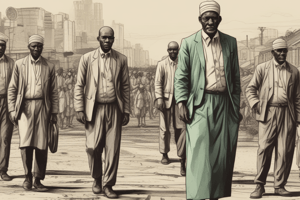Podcast
Questions and Answers
What is the primary significance of combining history with civics?
What is the primary significance of combining history with civics?
- To maintain historical records for future generations
- To understand civic responsibilities within historical context (correct)
- To promote nationalism and patriotism
- To memorize important dates in history
Which key event led to the establishment of democratic principles and individual rights in the U.S.?
Which key event led to the establishment of democratic principles and individual rights in the U.S.?
- The Civil Rights Movement
- The Women's Suffrage Movement
- The American Revolution (correct)
- The Fall of the Berlin Wall
What was a primary goal of the Civil Rights Movement of the 1950s and 1960s?
What was a primary goal of the Civil Rights Movement of the 1950s and 1960s?
- To secure women's right to vote
- To create a new Constitution
- To end racial segregation and discrimination (correct)
- To promote educational equality
What is considered one of the core civic responsibilities of citizens?
What is considered one of the core civic responsibilities of citizens?
Which of the following is NOT considered a right of citizens?
Which of the following is NOT considered a right of citizens?
Which structure of government ensures checks and balances?
Which structure of government ensures checks and balances?
How has globalization impacted civic awareness?
How has globalization impacted civic awareness?
What was a significant outcome of the Women’s Suffrage Movement in the U.S.?
What was a significant outcome of the Women’s Suffrage Movement in the U.S.?
Flashcards are hidden until you start studying
Study Notes
Overview of History Civics
- Definition: History civics combines the study of historical events with an understanding of civic responsibilities and rights within a society.
Importance of History in Civics
- Contextual Understanding: Provides context for civic rights and responsibilities.
- Learning from the Past: Helps avoid repetition of historical mistakes and celebrates progress.
- Civic Identity: Fosters a sense of belonging and identity within a nation or community.
Key Historical Events in Civics
-
American Revolution (1775-1783)
- Established principles of democracy and individual rights.
- Led to the creation of the Constitution and Bill of Rights.
-
Civil Rights Movement (1950s-1960s)
- Focused on ending racial segregation and discrimination.
- Led to landmark legislation like the Civil Rights Act (1964).
-
Women’s Suffrage Movement
- Advocated for women's right to vote.
- Resulted in the 19th Amendment in the U.S. (1920).
-
Fall of the Berlin Wall (1989)
- Symbolized the end of Cold War divisions.
- Highlighted the importance of freedom and democratic governance.
Civic Responsibilities
- Voting: Participation in elections to influence government.
- Community Engagement: Involvement in local organizations and initiatives.
- Civic Education: Understanding laws, rights, and duties as a citizen.
Rights of Citizens
- Civil Rights: Protection from discrimination and the right to equality.
- Political Rights: Right to vote and run for public office.
- Social Rights: Access to education, healthcare, and welfare.
The Role of Government
- Structure: Various branches (executive, legislative, judiciary) ensure checks and balances.
- Functions: Protect rights, provide services, and maintain order.
Impact of Globalization
- Cultural Exchange: Increased awareness of global civic issues.
- Transnational Movements: Advocacy for human rights across borders.
Conclusion
- Understanding the intersection of history and civics is crucial for informed citizenship.
- Engaging with historical context enhances awareness of current civic issues and responsibilities.
Overview of History Civics
- History civics intertwines the study of past events with the principles of civic responsibilities and rights in society.
Importance of History in Civics
- Contextual understanding of civic rights and responsibilities enhances awareness of their significance.
- Learning from past mistakes fosters progress and helps avoid historical repetitions.
- Promotes civic identity, cultivating a sense of belonging within communities and nations.
Key Historical Events in Civics
-
American Revolution (1775-1783):
- Established foundational democratic principles and individual rights.
- Resulted in the creation of the U.S. Constitution and the Bill of Rights.
-
Civil Rights Movement (1950s-1960s):
- Aimed to eliminate racial segregation and discrimination.
- Led to significant laws like the Civil Rights Act of 1964.
-
Women’s Suffrage Movement:
- Campaigned for women’s right to vote.
- Achieved the 19th Amendment in 1920, granting voting rights to women in the U.S.
-
Fall of the Berlin Wall (1989):
- Marked the end of Cold War divisions in Europe.
- Highlighted the global desire for freedom and democratic governance.
Civic Responsibilities
- Voting is essential for influencing governmental decisions and policies.
- Community engagement encourages participation in local organizations and initiatives.
- Civic education equips citizens with knowledge of their rights and responsibilities.
Rights of Citizens
- Civil rights encompass protections against discrimination and the guarantee of equality.
- Political rights include the right to vote and eligibility to run for office.
- Social rights guarantee access to essential services like education, healthcare, and welfare.
The Role of Government
- Government is structured into branches: executive, legislative, and judiciary, providing checks and balances.
- Functions include protecting rights, delivering public services, and maintaining societal order.
Impact of Globalization
- Cultural exchange expands understanding and awareness of global civic issues.
- Transnational movements advocate for human rights beyond national borders.
Conclusion
- Understanding the connection between history and civics is essential for responsible citizenship.
- Engaging with historical contexts deepens awareness of current civic responsibilities and challenges.
Studying That Suits You
Use AI to generate personalized quizzes and flashcards to suit your learning preferences.




